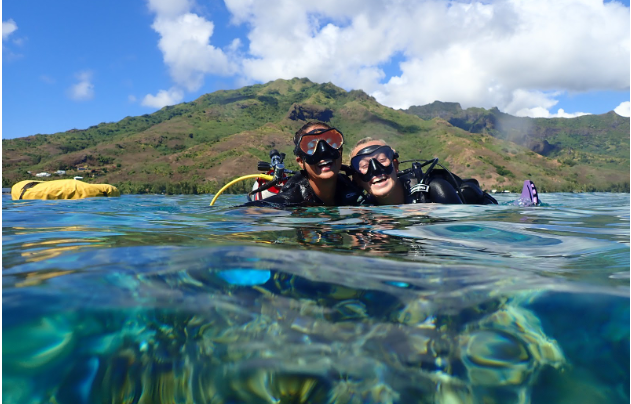
Enthusiasm and laughter are important components in order for a successful field season. Pictured are Dana and Lauren Enright, her field assistant, taking a break from data collection.
Credit: Journ Galvan
This spotlight is part of an ongoing series featuring many of our wonderful LTER Network graduate student representatives who contribute valuable research and leadership across the network. To learn more about graduate research in the LTER network, visit this page.
Dana Cook has been a graduate student with the Moorea Coral Reef LTER for the last 4 years. She spends about three months each summer conducting her research in French Polynesia, diving almost every day, and the rest of the year at her home campus, UC Santa Barbara. Kelsey Fennell, a communications fellow with the LTER Network Office, interviewed Dana about her research and her role as an LTER Graduate Student Representative.
KF: What is the main focus of your research?
DC: My research is on coral reef community ecology and monitoring the transition from coral dominance to algae dominance. Specifically, I study the interactions between herbivorous fish and algae and the competitive dynamics between them in order to know how these interactions influence the resilience of the algal community. What keeps the coral reef community in an algae state rather than transitioning back to coral dominance?
KF: What do you like about working at an LTER site? And what do you like specifically about your site?
DC: The cool part about working at an LTER is that you come in as a grad student and there’s already this whole history laid out for you. So I can look back and see how fish populations and algae populations have been changing for 17 years although I have only been coming for 4 years. The even cooler part about working in Moorea is that not only is there that scientific history, but there’s also a local community of people who are very connected to the ecosystem, so there’s this even larger traditional knowledge bank. It’s difficult to merge the two, but that’s something I’m really interested in doing.
KF: What do you do as a Grad Rep?
DC: Because our lab stays at the Moorea field station for the whole summer, we get to meet all of the other grad students and researchers that come and go. So that means I’m interacting with 30 or more grad students throughout the summer. Since there is no universal institution (geographical) that we all work under, my role is to connect everyone and send out info between investigators and the grad students when we are not all physically together.
I’m also helping to organize a research symposium with our LTER, Santa Barbara Coastal and California Current Ecosystems LTERs to showcase research between all three to find common themes and places for collaboration. A couple of my other duties involve outreach work. In Moorea, I organized an interactive field station tour for local kids to come and see the research station and hear from the grad students.
In Santa Barbara we also invite elementary students from LA every year to come visit the campus. We give presentations and play games to teach them about the coral and kelp ecosystems. And I think grad students are so good at that since they can explain their research in a pretty basic way and haven’t been in the field for 20+ years, so it’s easier to make that connection to younger kids.
KF: What does a typical day of research look like when you are at the site in the summer?
DC: For a typical day of field work in Moorea, we wake up, get some food in our bellies, get the boat loaded up with dive gear and any research material we’ll need. It might be mesh cages, rebar, a hammer and chisel, or for surveying, gear for setting up transects and underwater paper. I also spend a good amount of time just following individual fish around, watching their behavior, which sometimes can feel a little weird by hour 9 [chuckling].
KF: What are some of the most surprising or unexpected experiences you’ve encountered while working at your LTER site?
DC: I did not think that I would be operating an underwater drill, that’s for sure. Maybe I still shouldn’t be! I didn’t think that I would be doing so much MacGyvering and trying to figure out what I can do with zip ties and underwater epoxy. I also didn’t think that it would involve me just swimming around and observing things. There are so many reports you can read, but what I’ve learned from my advisors is that what really makes the difference is just going out and seeing phenomena and trying to find some patterns and being patient. I didn’t expect there to be so much of that, but I’m now so happy.
KF: What’s one thing you wish you knew about science/research/grad school when you were an undergrad?
DC: Something I wish I had known and have now learned is that no one knows the actual truth, and that being wrong is just as important as being right. Both move you forward toward knowing the whole system better. You can really learn from your own and others’ failures.
KF: What’s one other LTER site you’d love to visit?
DC: To me Andrews Forest looks spectacular and breathtaking with all the ecology. I also find it amazing that they use storytelling to do outreach about the site.
KF: In the next step of your career, what will you bring with you from your experiences at the LTER site?
DC: I’ll definitely bring with me the importance and power of collaboration. Working at an LTER is great because I can look over and just chat with a renowned expert in their field. By bringing together so many people from various disciplines we can tackle larger issues more holistically.









